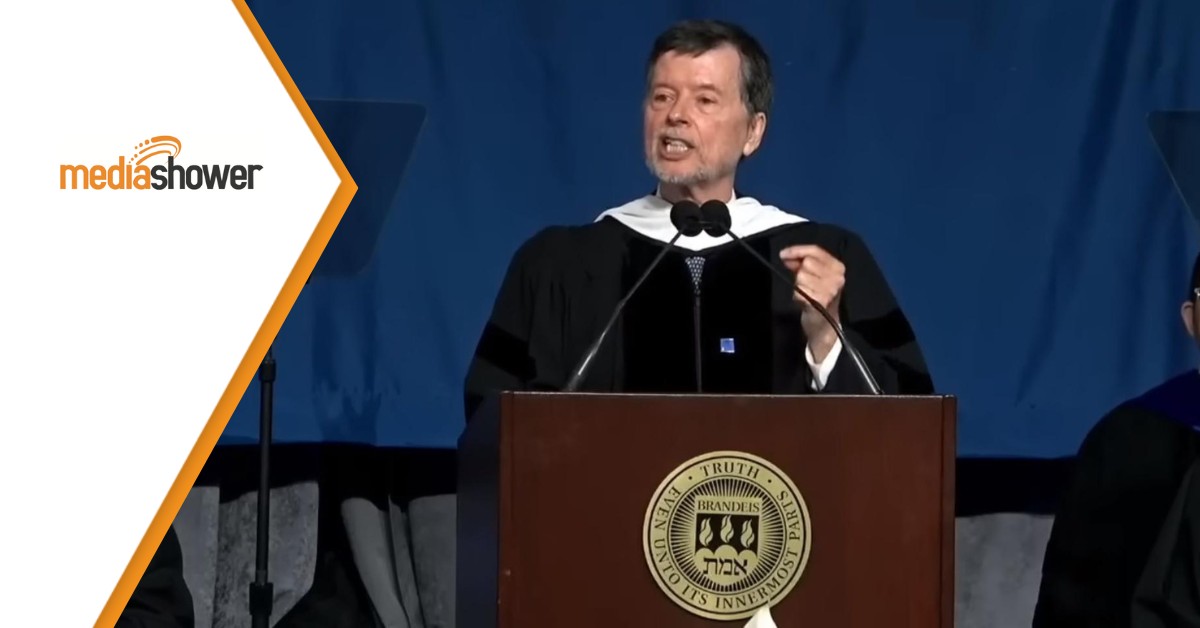
“I realize that multitudes and multitudes of people, for various reasons of their own, enslave themselves every hour of every day to this or that doctrine, this or that delusion of safety, this or that lie.”
You probably know him from documentary series like The Civil War, Baseball, or Jazz. He’s one of America’s greatest historians, and this year Ken Burns gave an historic speech.
In his 2024 Undergraduate Commencement speech at Brandeis University, historian and well-known documentary director Ken Burns provides thoughtful guidance, life advice, and warnings wrapped in a masterclass of effective communication.
Relying on his intimate understanding of history through his famous documentaries, Burns weaves a fabric of authoritative quotations, emotional appeals, and American storytelling to touch the soul of his audience. (Count the number of applause breaks.)
- He warns people of the dangers of shackling themselves with chains they may mistakenly think are freedom.
- He urges attendees to open their hearts to what he calls “the kinship of the soul.”
- And he encourages us to forego the temptation of making enemies by distinguishing between “us” and “them.”
Here’s what great communicators can learn from this historic commencement speech from one of the country’s great historians.
Use Storytelling to Make Your Case
Never has an argument, no matter how well-reasoned, changed someone’s perspective, argues Burns. Only a good story can achieve that.
In line with that credo, instead of listing historical facts and data, Burns builds his speech around personal narratives, making them relatable and tangible.
He uses Abraham Lincoln’s story to underscore America’s invulnerability to an outside foe. He then juxtaposes this image with the antithetic vulnerability of the nation to internal disputes and “othering.”
“Never. All the armies of Europe, Asia, and Africa could not by force take a drink from the Ohio River or make a track on the Blue Ridge in a trial of a thousand years. If destruction be our lot, we must ourselves be its author and finisher.”
Stringing together several stories, Burns skillfully builds his case, mentioning writer James Baldwin and philosopher Mercy Otis Warren’s observations about the intricacies and fallacies of the human soul.
His speech reaches its crescendo with the story of novelist Isaac Bashevis Singer. Singer could not understand the universal appeal of his Yiddish-language books and their “simple stories of life in the shtetls of Eastern Europe 1,000 years ago.” He concluded that their global appeal had to have stemmed from the “kinship of the soul,” that indefinable something that connects every human being.

Having introduced this beautiful concept and crowned it as the “solution” of his speech, Burns follows it with a series of powerful calls to action that feed off its energy and amplify its promise.
Create Emotional Connection
Burns’ stories create instant emotional connections with the audience. His arguments, wrapped in stories, evoke empathy, reverence, and gratitude. They strengthen the impact of his message, making it more persuasive.
Having built his case on solid logical and emotional foundations, Burns then calls upon the emotional capital he has created.
“We are at an existential crossroads in our political and civic lives. This is a choice that could not be clearer.”
The choice with which he presents his audience, the crossroads to which he refers, is U.S. Election Day in November. Riding the emotional waves of his speech, he leaves no room for ambiguity by declaring that he must suspend his longstanding attempt at neutrality, siding with the “kinship of the soul” over the “othering” that may destroy our “fragile 249-year-old experiment.”
Build Authority Through Quotations
Authoritative quotations, such as the ones Burns uses from Abraham Lincoln and Mark Twain, connect his message to universally recognized ideals. By quoting famous, well-respected people, orators can enlist the theoretical support of history’s greats for their arguments.
“As a nation of free men, we must live through all time or die by suicide.” – Burns quotes from Honest Abe’s 1838, Springfield, Illinois, speech. No one can hurt us but ourselves, he says. And Abraham Lincoln thought the same.
 Aligning your perspective with history’s greats strengthens your discourse.
Aligning your perspective with history’s greats strengthens your discourse.
Why are we prone to hurting ourselves?
“We there find a noble principle implanted in the nature of people, but when the checks of conscience are thrown aside, humanity is obscured.” – says Burns, quoting philosopher Mercy Otis Warren.
For his closing call to action, Burns uses a highly relevant and impactful quote from US Supreme Court Justice and Brandeis University namesake Louis Brandeis:
“The most important political office is that of the private citizen.”
He then equates the act of voting with reinforcing the “kinship of the soul,” the concept he touts as the antidote to division and the political opium peddled by simplistic binary thinkers.
Lessons for Communicators
In this historic commencement speech, Ken Burns successfully captivates his audience, delivering a touching message about the “kinship of the soul” and how we should let it shape our history instead of making and identifying enemies.
Here’s what you can learn, as a communicator:
- Humanize your message through storytelling. Abstract ideas are cumbersome, difficult to comprehend, and boring. Stories are relatable and engaging and create emotional connections. Arguments don’t change perspectives. Stories do. Share personal or other people’s relevant stories when discussing an issue. Historical narratives, case studies, and anecdotes work well.
- Inject emotional appeal. Emotions spark action. They add depth to the connections the orator establishes with the audience, enhancing the persuasiveness of the message. Stories elicit emotions. So do powerful, vivid images and evocative language. Do not hesitate to use descriptive language to engage your listeners’ minds.
- Use quotations to establish authority. Quotations anchor arguments to well-respected, universal ideals, lending them weight and credibility. They support your message and align it with established wisdom. Choose your quotations wisely. Quote experts, historical figures, or leaders relevant to your discourse. As a business speaker, you can quote Steve Jobs or Elon Musk when discussing innovation.
At Media Shower, we’ve helped over 500+ clients make their communication better. Click here for a free trial of our marketing communication platform.
